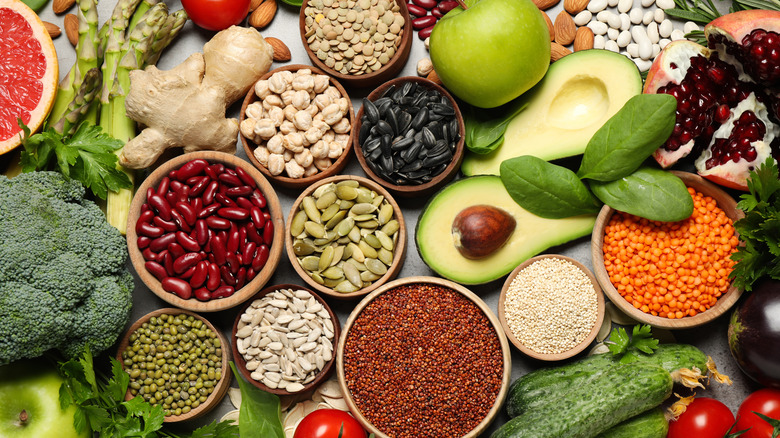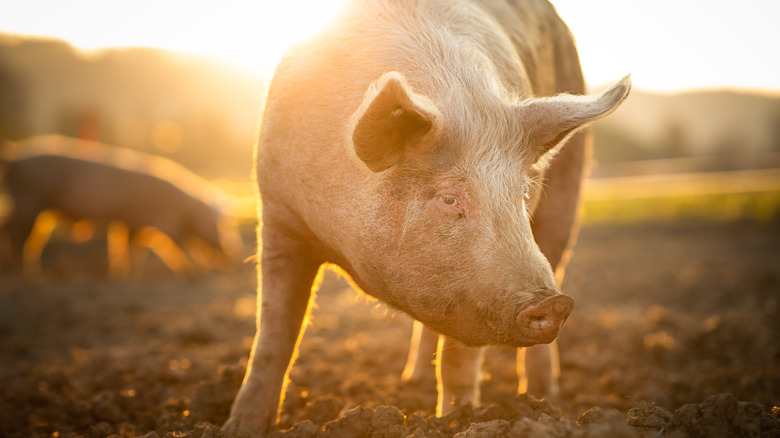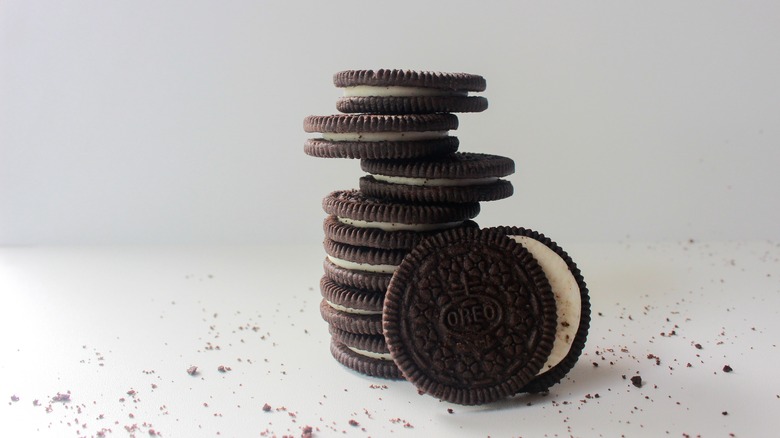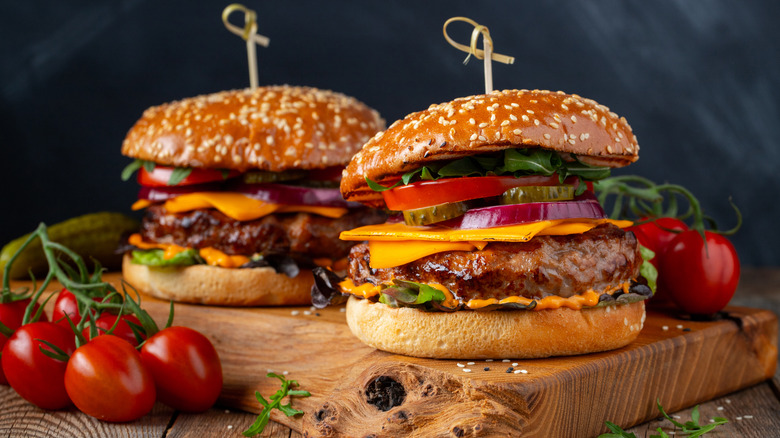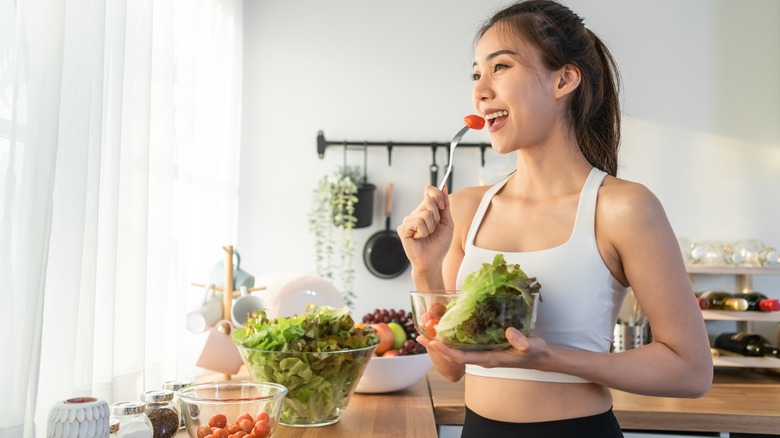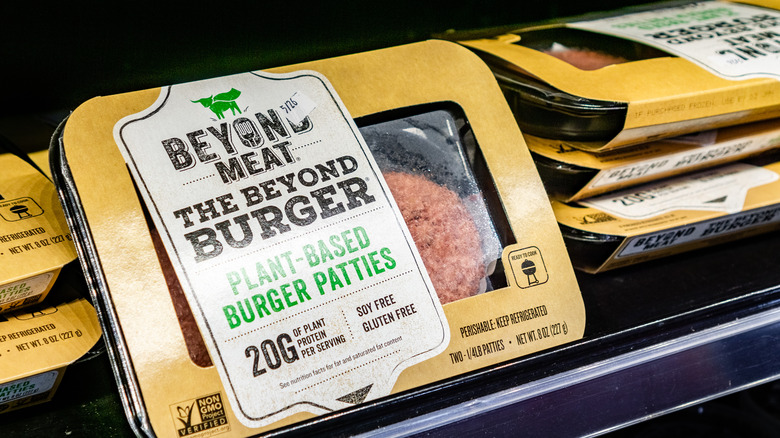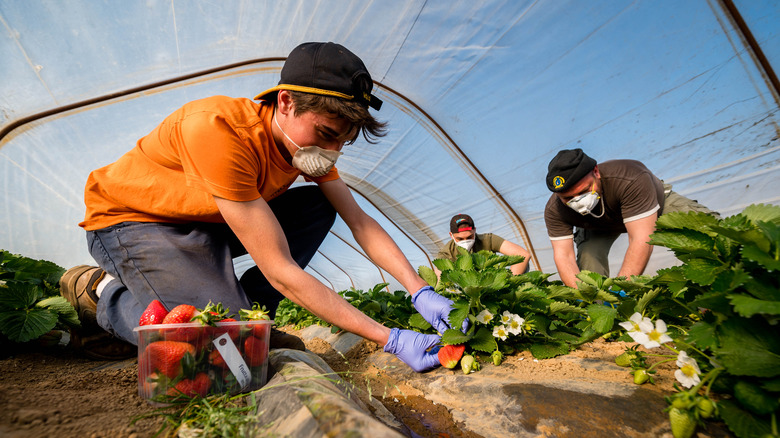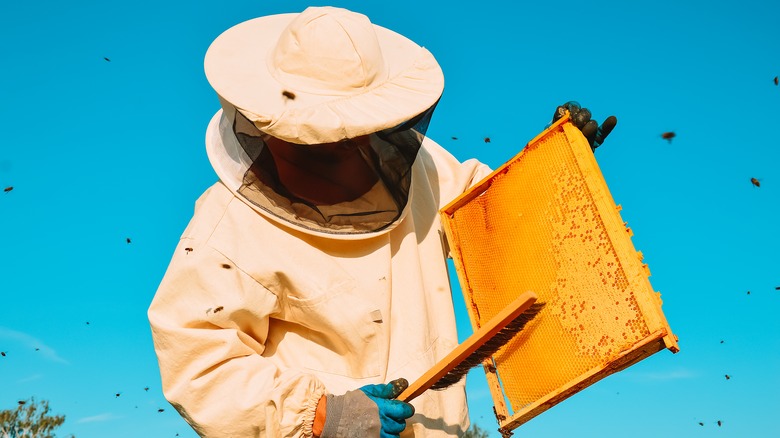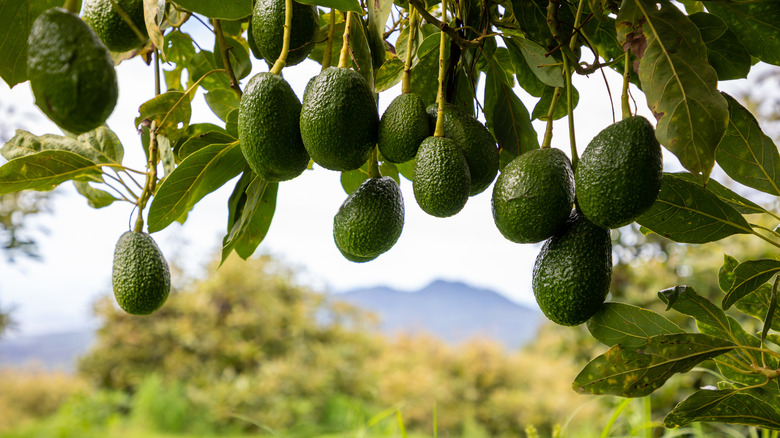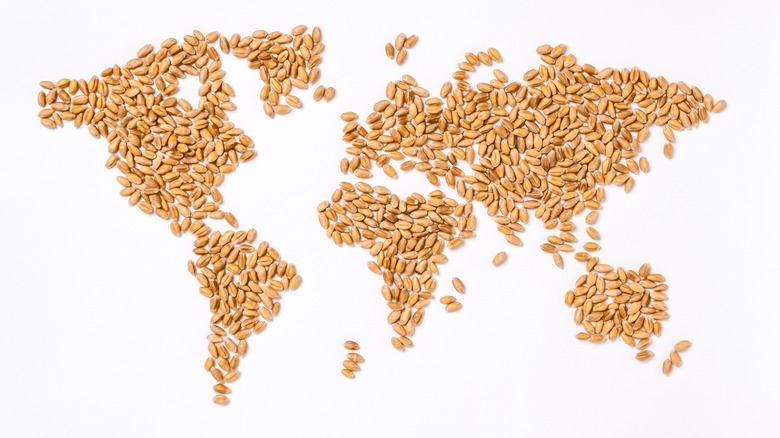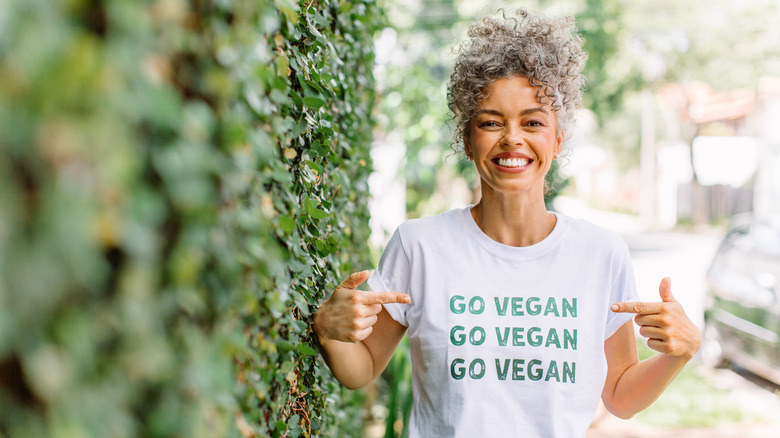13 Myths About Veganism, Debunked
If you follow food news religiously, you'll find that there is a new trend in diets almost every waking hour. But it seems like veganism may be one diet that's not going away any time soon. Per Pawsome Advice, only about 1% of the global population adheres to a vegan diet — which means those folks abstain from the consumption of animal products like milk, eggs, meat, and fish. Although this figure seems minimal compared to the population, it is important to consider that this figure is expected to grow to 10% by 2032.
Veganism has, without a doubt, impacted the food industry. Brands like Impossible Foods, JUST, and Beyond have grasped the environmental benefits of a plant-based diet to upsell the brand's plant-based meat product lines including burgers, sausages, and egg replacements. Grocery stores have begun to carry a wider variety of vegan products in stores, which in turn increases customer awareness for these alternative meat brands. On another level, restaurants like New York City's Avant Garden are responding to consumer demand by crafting vegan dishes that include not just plant-based meats, but also delicate, unconventional textures and flavors from chia, cashews, and tofu.
Despite its popularity, there are a lot of myths that exist about veganism and its taboos. Here are some of the most popular statements and assumptions made about the vegan diet.
1. Vegans don't get enough protein
According to the Harvard Medical School, the average person should consume 0.8 grams of protein per kilogram of body weight, or about 10% of the average person's daily caloric intake. The average American consumes 16% of daily calories in protein, which is significantly higher than the recommended daily intake.
Hidden in the argument that vegans don't get enough protein is also that vegans do not get the right kind of protein — meaning that not all plant-based proteins contain every essential amino acid that makes up a "complete protein." Nutritional science has rendered this a moot point though, as a proper diversified plant-based diet will include all of the amino acids the body needs.
While the average American may receive a bulk of the recommended daily intake of protein from cheese, processed meats, and eggs, vegans tend to get protein from alternative sources like nuts, grains, and soy. It is more than possible for a vegan to eat enough protein by eating a variety of protein-packed foods — it just might take more intent than throwing together a deli sandwich with processed sliced cheese and bologna.
2. Vegan and plant-based are the same thing
By Leslie J. Cross's definition of veganism, a vegan is someone who "seek(s) an end to the use of animals by man for food, commodities, work, hunting, vivisection, and by all other uses involving exploitation of animal life by man (per The Vegan Society). Therefore, veganism at its core advocates for the liberation of animals from all human activity (beyond diets). Many self-identified vegans will avoid using cosmetic or medical products tested on animals, as well as advocate for the closure of zoos, aquariums, and animal agriculture operations. There's an activism component in veganism that you don't see otherwise in definitions of "plant-based" eating, which simply means you only eat plants.
There is not often a distinction between those who refrain from eating animal products and those who engage in animal liberation activism — mostly because it would be too complicated to sort folks into separate groups. Therefore, veganism as a whole defines anyone who refrains from eating animal products.
3. Oreos are vegan
"Milk's favorite cookie" may not be as vegan as the vegan community makes it out to be. Although the Oreo cookie does not contain the obvious eggs or milk, there are some more nuanced non-vegan ingredients within the cookie's crevasses.
Per Veggl, Oreos contain conventional sugar, which may be processed with bone char. It is difficult to determine what sugars are processed with this animal-derived bleaching agent, so some vegans will avoid eating white sugar altogether. There is hope for bakers and vegans with a sweet tooth though; coconut sugar, beet sugar, and all organic sugars are not processed with bone char.
Oreos also contain palm oil — which has significant environmental and ethical repercussions. In countries where palm oil is produced, thousands of acres are cleared each year for production, thus eliminating many animal species. Some Oreos, such as golden Oreos, also contain several food colorings tested on animals. Both the direct and indirect linkages to animal exploitation cause many vegans to steer away from the cookies while others embrace the fact that Oreos are one of the only cookies in the grocery aisle without milk or eggs. Dig in, at your choosing.
4. All vegans miss meat (or cheese) at first
The transition to a vegan diet is individual and often based on how much familiarity someone has with alternative proteins. For example, individuals who eat tofu outside of animal-based proteins may find it easier to adapt more foods to a completely plant-based lifestyle compared to someone who is vehemently opposed to eating soy products. Additionally, some cultures have normalized alternative proteins more than American cuisine has; it is common to have an Asian stir fry or a soup with tofu or adapt a curry to include tofu rather than chicken.
As a whole, being vegan in the United States is easier now than ever before. You'll find numerous dairy-free cheese and vegan sausage alternatives as well as ready-to-eat dinners, sausages, and entrees at most conventional grocery stores. Online retailers like Amazon have expanded plant-based products to include vegan pantry staples like nutritional yeast, vital wheat gluten, and textured vegetable protein. Less than a decade ago, vegans were left to the mercy of a natural foods co-op much farther away from their residence than the modern grocery store.
5. The vegan community is unaccepting of meat eaters
Do we have to talk about this elephant in the room? Of course! Because although veganism sits at the nexus of a Hippocratic "do-no-harm" way of living, it also reinforces the idea that there is a seemingly puritanical "correct way" to be, eat, and interact with other life. As a result, many of these sentiments are translated to mean that those who adhere to a vegan diet are more caring, educated, or "correct" in their dietary choice. Overzealous vegans are especially vocal about dietary choices while other plant-based eaters go relatively undetected.
While there is some conflict coming from vegans towards non-vegans, there is significantly more empirical data about how non-vegans view vegans. According to a 2015 study in Group Processes & Intergroup Relations, vegans are viewed with a similar prejudice to other minority groups like drug users, immigrants, and people of color. The same study that examined anti-vegan prejudice noted that the groups studied viewed vegans and vegetarians for the most part unfavorably — especially those with prominent environmental and animal rights concerns. Right-wing conservative individuals expressed the greatest dislike of vegans and vegetarians in the groups studied.
6. Eating vegan is expensive
There are still sentiments that a vegan diet is significantly more expensive than a non-vegan one. A study published in The Lancet Planetary Health found that the most affordable plant-based diets in high-income countries were based around minimally processed grains and pulses like beans, legumes, and whole grains. This study did not focus on the cost of meat alternatives though, which require less time to prepare but typically carry a higher price tag.
If you're looking to integrate more plant-based foods into your diet relatively inexpensively, you're best off browsing the canned aisles and making meat alternatives yourself. Veggie burgers are just one food that can be made at home with frozen vegetables and grains; you'll get more whole nutrients and fiber than pre-packaged meat alternatives. If you're looking for a simple way to prepare plant-based proteins, grains, and veggies, try making a grain bowl at home inspired by Californian flavors and protein-rich quinoa.
7. All vegan food is healthy
Blanket statements regarding food are almost always false. While many whole foods like fruits, grains, and vegetables are full of antioxidants and fibers, other more processed foods like dairy-free cheeses, alternative meat products, and dips are often comprised of saturated fat and high-sodium, high-sugar ingredients. The best way to decipher the nutritional information behind each vegan product is to look at the label and compare macronutrients (protein, fat, and carbohydrates) and added ingredients like sodium, added sugar, and artificial sweeteners.
When it comes to eating a healthy vegan diet, the general recommendation is to eat a variety of foods and to eat in moderation. Foods high in fiber and protein — like soy, legumes, and whole grains — are more satiating than sugars. Moreover, pairing proteins and carbohydrates with fats can help improve satiety, overall cognition, and energy. Next time you snack on sliced vegetables, try incorporating hummus or guacamole for a filling (and delicious) combination.
8. Veganism isn't really that popular
The popularity of veganism is without a doubt growing. The reason for this expanded interest in veganism is likely due to several reasons — including the media and a desire to reduce the risk of diseases linked to the consumption of animal products. According to an article in The Conversation, young people are adopting plant-based (or at least "reducetarian") diets that limit the consumption of animal products more than older generations. The British Broadcasting Corporation (BBC) notes that young people have significantly more access to recipes on popular apps like TikTok and Instagram, as well as the ability to subscribe to plant-based YouTubers like Sean Callaghan (Fat Gay Vegan). Celebrities including Natalie Portman, Ellen DeGeneres, and Miley Cyrus have all touted the benefits of a plant-based lifestyle to their following.
Not only does the global network have more ways of sharing vegan recipes and lifestyles, but it also has more information about the benefits of eating a plant-based diet on the planet and our health. Empirical evidence has shown the connection between vegan diets and lower risks of obesity, cardiovascular disease, and even cancer over time.
9. Vegan food is cruelty-free
Although many members of the vegan community would like to believe that their organic strawberries and avocado toast were created without harm to human and non-human life, there are major ethical red flags that exist for all food products — vegan or not. Avocados, for example, are frequently pollinated by migratory bee populations that are moved via truck from location to location. Not only does this exploit the pollinator (the bee) for its services to humans, but it also exposes the bees to numerous pathogens and crippling colony collapses that kill millions of bees every year. But, are migratory pollinators a necessary evil, considering that close to a third of agriculture in the United States is dependent upon the human-facilitated movement of honeybees?
As a whole, the vegan movement also does a terrible job of identifying the onslaught of human rights and social ethic violations in the production of vegan products. According to the National Farm Worker Ministry, an activist group for farmworkers in the United States, farm workers experience regular occupational exposure to toxic pesticides; systematic barriers towards citizenship, education, and social services; and persistently low wages that impact opportunities for safe and secure housing, healthy food, and equitable living conditions.
10. Real vegans don't eat honey
Honey is a common sweetener used in processed food products and medicine. According to a review of clinical research, honey has been used as an antidepressant, anticonvulsant, and anti-inflammatory treatment for centuries and has many known benefits to human health. However, despite the production of honey necessitating the "labor" of bees, some vegans believe the inextricable connection between pollinators and produce makes the product acceptable for vegan consumption, per Treehugger. The consumption of honey would, in turn, mean that consuming fruits and vegetables made with bee-facilitated pollination is acceptable.
But the use of bees in commercial pollination operations also calls the systematic elimination of insects via pesticides into question. There is no way to know exactly how many insects die during the growing, harvesting, and processing steps of "vegan" food. Therefore, this gap in knowledge makes some vegans believe that eating honey is acceptable.
11. Veganism in America is predominately white
Examining the deeply radicalized aspects of lifestyle is a critical component of unpacking veganism. Modern white veganism fails to address critical systematic issues within the food system including land rights, capitalism, and racism. Moreover, white veganism tends to occupy most of the media attention around plant-based eating; diverse cultures and varying ethnic-racial identities have not received the same press and spotlight as white vegan chefs, writers, and creators, according to Leaders Igniting Transformation.
It isn't that radical to address the colonialist tendencies of the modern white veganism movement. Although veganism comes with a disguise of compassion and caring for the non-human, it ascribes to the systematic devaluation of people who consume meat as being "less-than," regardless of the individual's autonomy over a diet. Moreover, white veganism fails to address the reasons why people aren't eating vegan food: access, expense, and culture. Until the white vegan movement addresses the disparities and inequities that create these gaps, white vegans yelling at meat-eaters will almost always be viewed as "tone-deaf."
12. Being a vegan is better for the environment
The actual benefit of the vegan diet on the environment has been contested by animal agriculture proponents and components. Empirical evidence suggests that meat production is dependent on significantly more inputs (like grain, silage, water, and energy) than the production of plants. These inputs account for significant portions of carbon dioxide emitted into the atmosphere every year. Animal agriculture also consumes thousands of acres of land each year for not only keeping livestock but also for feeding the industry.
According to the University of California, Davis, there are some benefits to animal agriculture — especially related to ruminants like sheep and cows. Ruminants are able to consume the cellulose in grasses and turn it into a protein useful to humans. Grazing herds of ruminants on large tracts of high-altitude pastures, where growing plants would be otherwise unsustainable, can be an effective use of marginal lands.
13. We can't feed everyone globally on a vegan diet
It's reasonable to identify that plant-based diets have the potential to improve dietary health and the environment, but would it be possible to convert all animal agricultural land and resources to vegan food production? Not necessarily. Faunalytics notes that although some cereals grown for animals can be replaced with grains grown for people, this doesn't always apply to marginal lands where it is not habitable for vegetable crops to grow. Plus, there are numerous ethical concerns about putting animal agricultural employees, farm owners, and farm operators out of work.
We should also note that not everyone can go vegan entirely, or at least not without considerable effort and planning. Per information from the NHS Scotland, people at risk for health complications while consuming a vegan diet include children and folks who are pregnant. IAmGoingVegan notes that allergies and intolerances to high-fiber foods and gluten can also cause dietary upset and poor health complications.
14. The only sustainable diet option is veganism
It is unrealistic to expect everyone to go vegan tomorrow. But, there are some changes we all can make to our diets to eat fewer animal products for the benefit of numerous planetary systems and our personal well-being. If you plan on trying to eat more vegan foods but would prefer not to shift your whole diet to vegan, that is also a plausible option that allows for flexibility in dietary choice. Or, consider Mark Bittman's VB6 diet, which involves eating vegan, but only before 6 p.m. It's perfect for folks who don't want to give up a late-night pizza trip.
Whether you're choosing a vegan diet for the environment, your health, or for ethical concerns, you should know that your reasons are valid — and so are your reasons not to avoid plant-based foods. Dietary choice is a concept deeply tied to accessibility, wealth, knowledge, and culture. Therefore, trying to shun a "vegan" for eating Oreos or honey isn't a topic of productive conversation.
